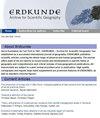On the influence of mountain and heritage tourism in Georgia: the exemplary case of Ushguli
IF 1.1
4区 社会学
Q3 GEOGRAPHY
引用次数: 2
Abstract
This study centres on the village community of Ushguli, located in the Upper Svaneti region in the north of Georgia. After attaining UNESCO World Heritage status in 1996, and benefiting since around 2010 from the establishment of secure state structures and systems, Ushguli has seen an incremental rise in tourism. Thus far, it has been relatively unprepared for meeting the interests and needs of visitors and coping with the diversity characterising modern lifestyles. The encounter and in many instances clash of interests between villagers and tourists is correspondingly difficult to channel and manage; visitor numbers are continuously growing, due at least in part to local residents’ efforts to advance their economic goals. Ushguli therefore represents a space offering ideal experimental conditions for the exploration of tourism as a strategy for overcoming economic and social crisis and of its effects on preexisting spatial, economic, environmental and social structures, against a backdrop of change to material and immaterial objects driven by various stakeholders. This article provides an overview of the specific focus of this study, commenced in 2017 and planned to cover a duration of several years, and of the research approach taken, as well as outlining central findings.论格鲁吉亚山地与遗产旅游的影响:以乌什古利为例
这项研究的中心是位于格鲁吉亚北部上斯瓦涅季地区的Ushguli村社区。1996年,乌什古利被联合国教科文组织列为世界遗产,2010年前后,乌什古利得益于安全的国家结构和体系的建立,旅游业逐步发展。到目前为止,它在满足游客的兴趣和需求以及应对现代生活方式的多样性方面还相对缺乏准备。村民和游客之间的相遇,在许多情况下,利益冲突相应地难以引导和管理;游客人数持续增长,至少部分原因是当地居民努力推进他们的经济目标。因此,乌什古利代表了一个空间,为探索旅游作为克服经济和社会危机的战略及其对预先存在的空间,经济,环境和社会结构的影响提供了理想的实验条件,在各种利益相关者推动的物质和非物质对象变化的背景下。本文概述了该研究的具体重点,该研究于2017年开始,计划持续数年,以及所采取的研究方法,并概述了中心发现。
本文章由计算机程序翻译,如有差异,请以英文原文为准。
求助全文
约1分钟内获得全文
求助全文
来源期刊

Erdkunde
地学-自然地理
CiteScore
2.00
自引率
7.10%
发文量
17
审稿时长
>12 weeks
期刊介绍:
Since foundation by Carl Troll in 1947, ''ERDKUNDE – Archive for Scientific Geography'' has established as a successful international journal of geography. ERDKUNDE publishes scientific articles covering the whole range of physical and human geography. The journal offers state of the art reports on recent trends and developments in specific fields of geography and comprehensive and critical reviews of new geographical publications. All manuscripts are subject to a peer-review procedure prior to publication. High quality cartography and regular large sized supplements are prominent features of ERDKUNDE, as well as standard coloured figures.
 求助内容:
求助内容: 应助结果提醒方式:
应助结果提醒方式:


